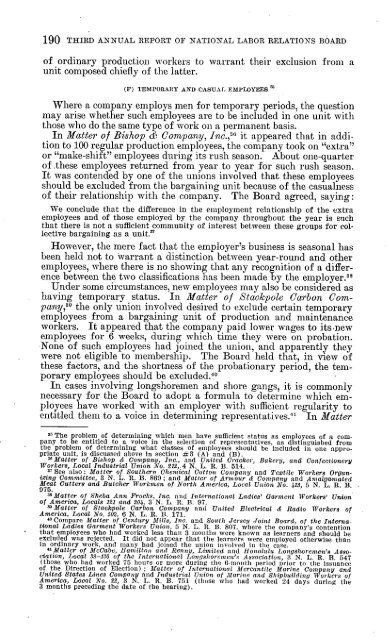NATIONAL LABOR RELATIONS BOARD
NATIONAL LABOR RELATIONS BOARD
NATIONAL LABOR RELATIONS BOARD
You also want an ePaper? Increase the reach of your titles
YUMPU automatically turns print PDFs into web optimized ePapers that Google loves.
190 THIRD ANNUAL REPORT OF <strong>NATIONAL</strong> <strong>LABOR</strong> <strong>RELATIONS</strong> <strong>BOARD</strong><br />
of ordinary production workers to warrant their exclusion from a<br />
unit composed chiefly of the latter.<br />
(F) TEMPORARY AND CASUAL EMPLOYEES<br />
Where a company employs men for temporary periods, the question<br />
may arise whether such employees are to be included in one unit with<br />
those who do the same type of work on a permanent basis.<br />
In Matter of Bishop & Company, Ine., 39 it appeared that in addition<br />
to 100 regular production employees, the company took on "extra"<br />
or "make-shift" employees during its rush season. About one-quarter<br />
of these employees returned from year to year for such rush season.<br />
It was contended by one of the unions involved that these employees<br />
should be excluded from the bargaining unit because of the casualness<br />
of their relationship with the company. The Board agreed, saying :<br />
We conclude that the difference in the employment relationship of the extra<br />
employees and of those employed by the company throughout the year is such<br />
that there is not a sufficient community of interest between these groups for collective<br />
bargaining as a unit!'<br />
However, the mere fact that the employer's business is seasonal has<br />
been held not to Warrant a distinction between year-round and other<br />
employees, where there is no showing that any recognition of a difference<br />
between the two classifications has been made by the employer.38<br />
Under some circumstances, new employees may also be considered as<br />
having temporary status. In Matter of Stackpole Carbon Company<br />
,39 the only union involved desired to exclude certain temporary<br />
employees from a bargaining unit of production and maintenance<br />
workers. It appeared that the company paid lower wages to its new<br />
employees for 6 weeks, during which time they were on probation.<br />
None of such employees had joined the union, and apparently they<br />
were not eligible to membership. The Board held that, in view of<br />
these factors, and the shortness of the probationary period, the temporary<br />
employees should be excluded.40<br />
In cases involving longshoremen and shore gangs, it is commonly<br />
necessary for the Board to adopt a formula to determine which employees<br />
have worked with an employer with sufficient regularity to<br />
entitled them to a voice in determining representatives." In Matter<br />
85 The problem of determining which men have sufficient status as employees of a company<br />
to be entitled to a voice in the selection of representatives, as distinguished from<br />
the problem of determining what classes of employees should be Included in one appropriate<br />
unit, is discussed above in section #3 (A) and (B).<br />
Matter of Bishop & Company, Inc., and United Cracker, Bakery, and Confectionery<br />
Workers, Local Industrial Union. No. 2, .4 N. L. R. B. 514.<br />
37 See also : -Matter of Southern Chemical Cotton Company and Textile Workers Organizing<br />
Committee, 3 N. L. R. B. 869; and Matter of Armour & Company and Amalgamated<br />
Meat Cutters and Butcher Workmen of North America, Local Union No. 413, 5 N. L. R. B.<br />
975.<br />
38 Matter of Sheba Ann Frocks, Inc. and International Ladies' Oarmcnt Workers' Union<br />
of America, Locals 121 and 204, 3 N. L. R. B. 97.<br />
82 Matter of Stackpole Carbon Company and United Electrical i Radio Workers of<br />
America, Local No. 502, 6 N. L. It. B. 171.<br />
Compare Matter of Century Mills, Inc. and South Jersey Joint Board, of the International<br />
Ladies Garment Workers Union, 5 N. L. R. B. 807, where the company's contention<br />
that employees who had worked less than 3 months were known as learners and should be<br />
excluded was rejected. It did not appear that the learners were employed otherwise than<br />
in ordinary work, and many had joined the union involved in the case.<br />
41 Matter of McCabe, Hamilton and Ronny, Limited and Honolulu Longshoremen's Association,<br />
Local 38-136 of the International Longshoremen's Association, 3 N. L. R. B. 547<br />
(those who had worked 75 hours or more during the 6-month period prior to the issuance<br />
of the Direction of Election) ; Matter of International Mercantile Marine Company and<br />
United States Lines Company and Industrial Union of Marine and Shipbuilding Workers of<br />
America, Local No. 22, 3 N. L. R. B. 751 (those who had worked 24 days during the<br />
3 months preceding the date of the hearing).

















